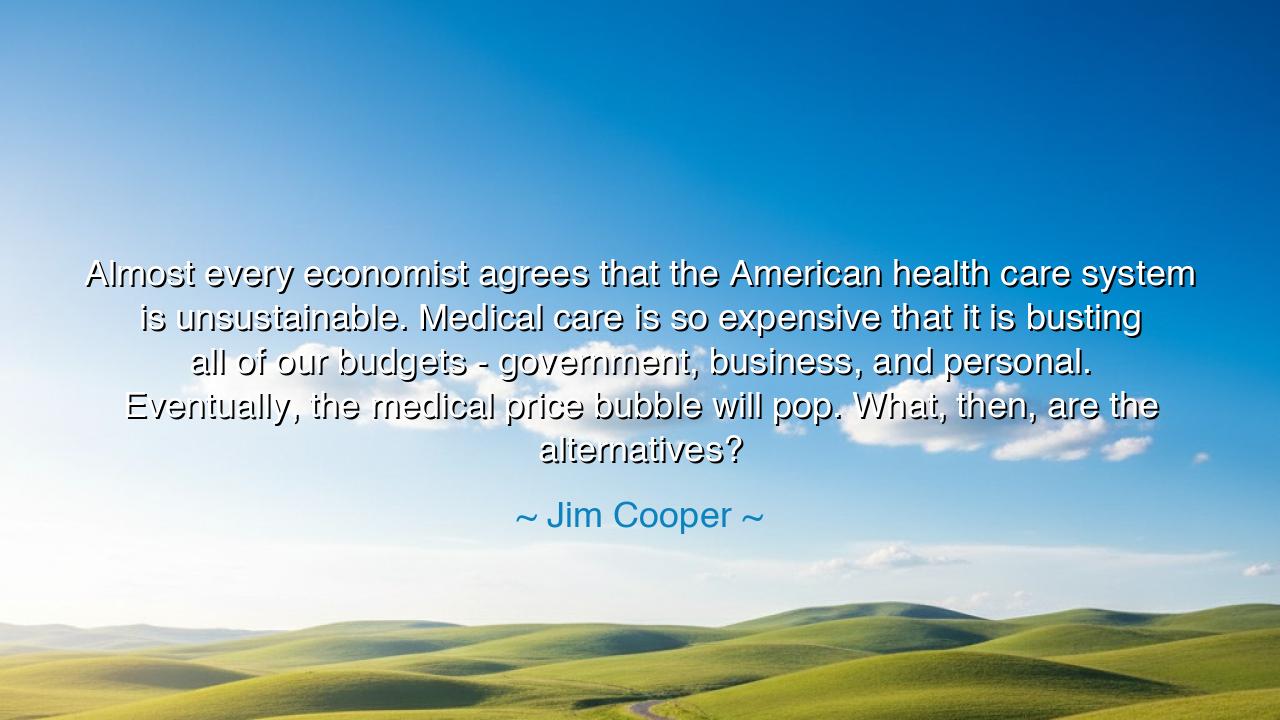
Almost every economist agrees that the American health care
Almost every economist agrees that the American health care system is unsustainable. Medical care is so expensive that it is busting all of our budgets - government, business, and personal. Eventually, the medical price bubble will pop. What, then, are the alternatives?






In the grave and prophetic words of Jim Cooper, “Almost every economist agrees that the American health care system is unsustainable. Medical care is so expensive that it is busting all of our budgets — government, business, and personal. Eventually, the medical price bubble will pop. What, then, are the alternatives?” we hear the lament of a civilization standing upon the edge of its own creation. His words are not merely economic—they are moral, a warning from a man who has seen the machinery of progress begin to devour the very people it was built to serve. In this statement, Cooper does not speak only of policy or finance; he speaks of the ancient imbalance that arises when human compassion becomes entangled in profit, and when healing—once sacred—is measured in currency instead of care.
The origin of this quote lies in the long and troubled history of American health care, where medicine, once the art of mercy, has grown into an industry vast and consuming. As a legislator and thinker, Cooper witnessed the steady inflation of medical costs that burdened every level of society. His words emerge from the sorrowful recognition that the system designed to save lives has begun to threaten livelihoods. The bubble he describes is not merely financial, but spiritual: a swelling of excess and inefficiency, a consequence of forgetting that the true purpose of medicine is not wealth, but wellness. Just as empires of old fell under the weight of their greed, so too, he warns, may modern systems collapse under the price of their own success.
To the ancients, health was regarded as a sacred trust between healer and patient, not a contract of exchange. In the temples of Asclepius, the sick were treated as pilgrims, not customers. The physician was a steward of life, not an accountant of costs. Yet in our age, the healer has been replaced by the provider, and the sick by the consumer. Cooper’s lament is thus not merely for America, but for all humanity—for the loss of balance between compassion and commerce. He reminds us that when the cost of care rises beyond reach, what dies first is not wealth, but trust.
History offers us many warnings of such excess. In the waning days of Ancient Rome, the state grew fat upon taxation and spectacle, while neglecting the needs of its citizens. The empire’s grandeur masked its decay; its marble temples shone even as its people suffered. When the collapse came, it was not sudden, but inevitable. So too does Cooper foresee a reckoning—a time when the system, inflated beyond reason, will no longer sustain its own weight. The “medical price bubble” he speaks of will burst not in silence, but in crisis: hospitals shuttered, families bankrupted, lives lost not for lack of medicine, but for lack of wisdom.
Yet within his warning lies a seed of hope. “What, then, are the alternatives?” he asks—not as despair, but as invitation. The question itself is an act of faith in human ingenuity and moral courage. The alternatives he speaks of are not merely new policies or technologies, but a new ethic—a return to the ancient understanding that the measure of a society lies in how it treats its weakest. To reform the system is not just to change the numbers, but to reawaken the conscience. It is to remind ourselves that a civilization that prices out the poor from healing has already begun to decay.
Consider the example of Jonas Salk, who created the polio vaccine and refused to patent it. When asked who owned the rights, he said, “The people. Could you patent the sun?” In that simple answer lies the antidote to Cooper’s warning. Salk understood that medicine belongs to humanity, not the marketplace. His legacy endures because it was built not on profit, but on principle. In remembering such figures, we are reminded that the future of healing depends on those who serve first and profit second—those who see in each patient not a dollar, but a destiny.
And so, the lesson is clear: the health of a nation is not measured by its hospitals, but by its humanity. We must not wait for the bubble to burst before we act. We must demand systems that balance innovation with compassion, efficiency with equity. Let the young doctor study not only anatomy, but empathy; let the policymaker remember that behind every statistic stands a soul. For as Cooper warns, the cost of indifference is greater than any medical bill. If we do not reform the heart of our care, no economy will save us. But if we rediscover the sacred duty of healing, then even in a world of science and steel, medicine will once again become a covenant of mercy—and humanity will heal itself, both in body and in spirit.






AAdministratorAdministrator
Welcome, honored guests. Please leave a comment, we will respond soon